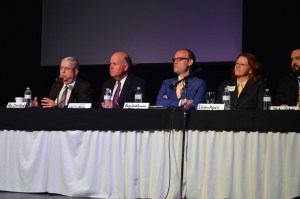
Oklahoma’s more than 70 business incentives are one of the primary ways the state attempts to create jobs and encourage businesses to locate and expand in Oklahoma. These tax credits, tax exemptions, and cash rebates also have a significant cost. Each year they reduce the revenue that could otherwise be used for public services by hundreds of millions of dollars.
Policymakers have struggled to determine which incentives are working, which are not, and how the state can make sure it’s getting a strong return on taxpayer dollars. Oklahoma has no formal, ongoing method to measure the effectiveness of its incentives. Though legislators have made attempts to review these programs over the years, lawmakers found that an absence of data, direction, and agency coordination stymied their progress. But a new effort aims to provide the evidence they need to evaluate tax incentive programs and invest in those that work.
The Business Incentives Initiative
To help solve this problem, Oklahoma policymakers have been working with The Pew Charitable Trusts since March of 2014. Pew, along with the Office of Management and Enterprise Services, the Oklahoma Tax Commission, the Oklahoma Department of Commerce, and the Treasurer’s office, conducted interviews, presented at policy panels, and met with business leaders.
Based on these conversations, the team identified four ways the state could improve:
- Define incentive goals. The majority of Oklahoma’s incentives do not have measurable goals. As a first step to understanding whether a program is working, you have to know what it was intended to achieve.
- Gather more data on incentive outcomes. To understand the results of incentives, the state needs to collect high-quality data on their fiscal and economic impact.
- Establish a process to evaluate the state’s entire suite of business incentives. The state should evaluate its incentives on a regular cycle. Then, lawmakers will have the evidence they need to make better economic development policy decisions.
- Improve revenue forecasting. Oklahoma officials need to have a good idea of when and how incentives will affect the state budget. That way, the state will be able to better plan ahead and avoid unexpected budget cuts.
Policy Proposals
Four bills to implement the Pew proposals were filed this session by Senate President Pro Tem Brian Bingman and House Speaker Jeff Hickman. The bills have cleared their first round of committee review (as of late February).
Senate Bill 815 and its companion, House Bill 2182, establish a comprehensive, recurring evaluation process. They create a schedule for evaluation, provide criteria for economic analysis, allow for interagency data sharing, and ensure evaluators will consider the long-term fiscal impact of business incentives.
The bills allow the state to contract with a third party, such as a university or private-sector economist, to conduct the assessments and to make recommendations about whether to amend, extend, or terminate each incentive.
Senate Bill 806 and House Bill 2183 instructs lawmakers to include a statement of measurable goals with any new incentive they create. As a result, evaluators will know what lawmakers intended and will be able to measure whether the programs achieved their objectives.
Gov. Fallin supported the legislation in her State of the State speech this February, saying:
These evaluations will give us all better information so we can make better decisions. I am asking you to send me this bill and help all of us get the information we need to make well-informed, fiscally responsible decisions.
If Oklahoma enacts these proposals, it would join the 10 states and the District of Columbia that have passed evaluation laws or expanded existing processes since 2012.
It’s important to note that while many elected officials have referred to tax credit reform this year in the context of the state’s huge budget shortfall, the proposals emerging from the Pew study will not have any short-term fiscal impact as they do not call for the immediate elimination or suspension of any existing incentives. Rather they would put new mechanisms in place for evaluating existing and new incentive programs in the future.
It’s also important that the Pew proposals be seen as a strong starting-point, not as the last word regarding tax expenditure policy. The proposals would implement key recommendations that we offered several years ago to make tax expenditures more transparent and accountable, but other reforms should still be considered. These include providing more detailed and coordinated information on all existing tax breaks; requiring sunset provisions for all tax incentives; limiting the state’s fiscal exposure by placing caps on the amount of tax credits that can be claimed; and adding triggers that would suspend or reduce selected preferences in times of budget shortfalls.
The promise of the Pew proposals is that better data on the results of incentives will enable Oklahoma to get the best possible results for our economy, taxpayers, and budget. At the end of the day, it will still be up to the Legislature to decide what, if any, action to take to ensure that effective programs are continued and ineffective ones are ended.





 OKPOLICY.ORG
OKPOLICY.ORG


